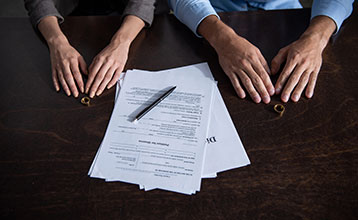In Singapore, adultery is not a ground for divorce on its own. The only sole ground for divorce is in section 95(1) of the Women’s Charter. It provides that either party to the marriage may file for divorce on the grounds that the marriage has irretrievably broken down. If the court is satisfied that it is just and reasonable to grant a divorce, it will do so after an inquiry into the facts.
However, section 95(3) limits the court’s powers by stating that the court shall not hold the marriage as broken down irretrievably unless the plaintiff can establish one of five grounds.
The first of these grounds mentioned in s 95(3)(a) is adultery.
What is adultery?
Adultery is when a married person has voluntary sexual intercourse with someone who is not their spouse. If there was no sexual intercourse, you cannot establish adultery.
Adultery alone is not, however, sufficient. S 95(3)(a) states that the person seeking the divorce (the plaintiff) must also prove that the adultery made it intolerable to live with the defendant. The court will look at the circumstances and the personalities of both parties to determine whether it is intolerable for the plaintiff to live with the defendant after the adultery. The court’s test is whether a reasonable person would find it intolerable.
Proving adultery
The courts in Singapore require a very high standard of proof to succeed with a claim of adultery. The plaintiff must prove sexual intercourse with another person on a balance of probabilities.
Often, it is not easy to find direct evidentiary proof of sexual intercourse. Unless the defendant admits and confesses to the adultery, the plaintiff will have to rely on other sources to provide evidence. It might be necessary to engage the services of a private investigator to get direct evidence of the adultery.
If there is no visual evidence of your spouse having sexual intercourse with another person, you may offer circumstantial evidence showing that the defendant had the opportunity to commit adultery.
Photographs or video evidence, for example, of your spouse and someone else entering a hotel room or spending time in a hotel room may assist your case.
Similarly, evidence of emails, SMS’s or other forms of social media communications may serve as circumstantial proof of adultery. Other forms of evidence like air tickets, hotel bookings, restaurant receipts, etc., can be helpful evidence to strengthen your claim of adultery. Written testimonies of people who saw the couple and can confirm that their interaction was indicative of an extramarital affair could assist the plaintiff in meeting the burden of proof.
The existence of an illegitimate child and DNA evidence to prove that the child is not yours will be solid evidence of an extramarital affair.
Proving adultery ultimately requires proving sexual penetration. Intimate conduct alone, such as kissing or embracing, is not sufficient to establish adultery. Such evidence may, however, be valuable indirect evidence to prove adultery.
Although the burden of proving adultery is very high, the court has a lower standard in deciding whether the adultery made it intolerable for the plaintiff to live with the defendant after the adultery. Once adultery is established, the court is likely to find it intolerable for the plaintiff to live with the defendant.
What if you cannot prove adultery?
Without a confession, an illegitimate child, or other direct evidence, it may be challenging to succeed with a claim of adultery. Suppose you cannot find sufficient evidence of adultery or your spouse’s conduct falls short of the definition of adultery. In that case, the Women’s Charter provides an alternative ground for divorce.
Section 95(3)(b) provides that the court may hold the marriage broken down irretrievably if the defendant has behaved in a way that the plaintiff cannot reasonably be expected to live with the defendant. This ground is also referred to as “unreasonable behaviour“. Behaviour such as constant flirting or behaving intimately with a third person may satisfy the requirements of sec 95(3)(b).
If you cannot find conclusive evidence of adultery, “unreasonable behaviour” might be your best option to prove an irretrievable breakdown of the marriage. You only need to prove that the defendant behaved in a way that you cannot reasonably be expected to live with the defendant any longer. You do not need to prove adultery. Your spouse’s improper conduct or association with the other person may be sufficient to prove unreasonable behaviour. An experienced divorce lawyer can evaluate your evidence and advise on the best course of action in your circumstances.
Is there a time limit within which to file a claim based on adultery?
Yes, s 95(5)(b) states that the plaintiff must file the claim within six months from becoming aware of the adultery. If the plaintiff continues to live with the defendant for more than six months after finding out about the adultery, the plaintiff can no longer file for divorce based on adultery.
However, when the court must decide whether the plaintiff finds it intolerable to live with the defendant, the court shall disregard any period less than six months that the couple lived together after finding out about the adultery.
Plaintiffs should remember this six-month time limit if they decide to forgive their spouse for the adultery and try to make it work. After six months, you cannot file for divorce based on adultery anymore. It may also be challenging to prove that living with the defendant is intolerable after the adultery if you decide to stay longer than six months before filing for divorce.
Who can file for divorce based on adultery?
You can file for divorce if you are a Singapore citizen, domiciled in Singapore, or have lived in Singapore for at least three years immediately before filing for divorce.
Section 94 further states that no one may file for divorce in the first three years of marriage. In exceptional circumstances, s 94(2) allows a party to apply to the court for permission to file for divorce if they are married for less than three years.
The six-month time limit might complicate matters if you are married for less than three years and legally not allowed to file for divorce yet. If you find out that your spouse committed adultery and you have been married for less than three years, you should consult with an experienced family lawyer as soon as possible.
Please take note that an adulterer cannot file for divorce based on their own adultery. The wording of the Women’s Charter clearly states that the plaintiff can file for divorce based on the fact that “the defendant committed adultery and the plaintiff finds it intolerable to live with the defendant”.
How will a finding of adultery impact the ancillary matters of your divorce?
Adultery alone should not have a negative impact when the court decides on the division of matrimonial property, maintenance, or the care and custody of the children. The court may order the adulterer to pay the costs of the divorce proceedings, but it remains in the court’s discretion.
Adultery is not a crime in Singapore, and “fault” is not a factor when the court decides on ancillary matters.
The court will follow section 112(2) of the Women’s Charter when deciding on the division of matrimonial assets. This means the court will order the property division in proportion to what the court thinks is just and equitable.
When dealing with the welfare of the children, the paramount consideration is the best interest of the children. If the adultery does not affect the defendant’s ability to be a good parent, it will not be considered.
If the defendant’s lifestyle is, however, such that it may negatively impact the children, the court will take it into account. For example, suppose the defendant is a serial adulterer or leads a promiscuous life that will harm the children’s moral upbringing. In that case, the court will take it into account when making orders relating to the welfare of the children.
From the plaintiff’s viewpoint, adultery is not a pathway to getting a “better deal”. The court will act according to the law.
Finding out your spouse is committing adultery can be devastating. You might forgive your spouse and work things out, or you may decide to file for divorce. If you are considering divorce, you should speak with an experienced family lawyer.
You need to present a well-prepared case with conclusive evidence to satisfy the high burden of proof in adultery divorce cases. An experienced family lawyer can assist you in preparing a solid case and meeting the burden of proof. They will also guide you towards the best options and outcomes for your case.
Fixed, clear & transparent fees
$1,490
No children, property or maintenance
$2,490
With children, property and maintenance


